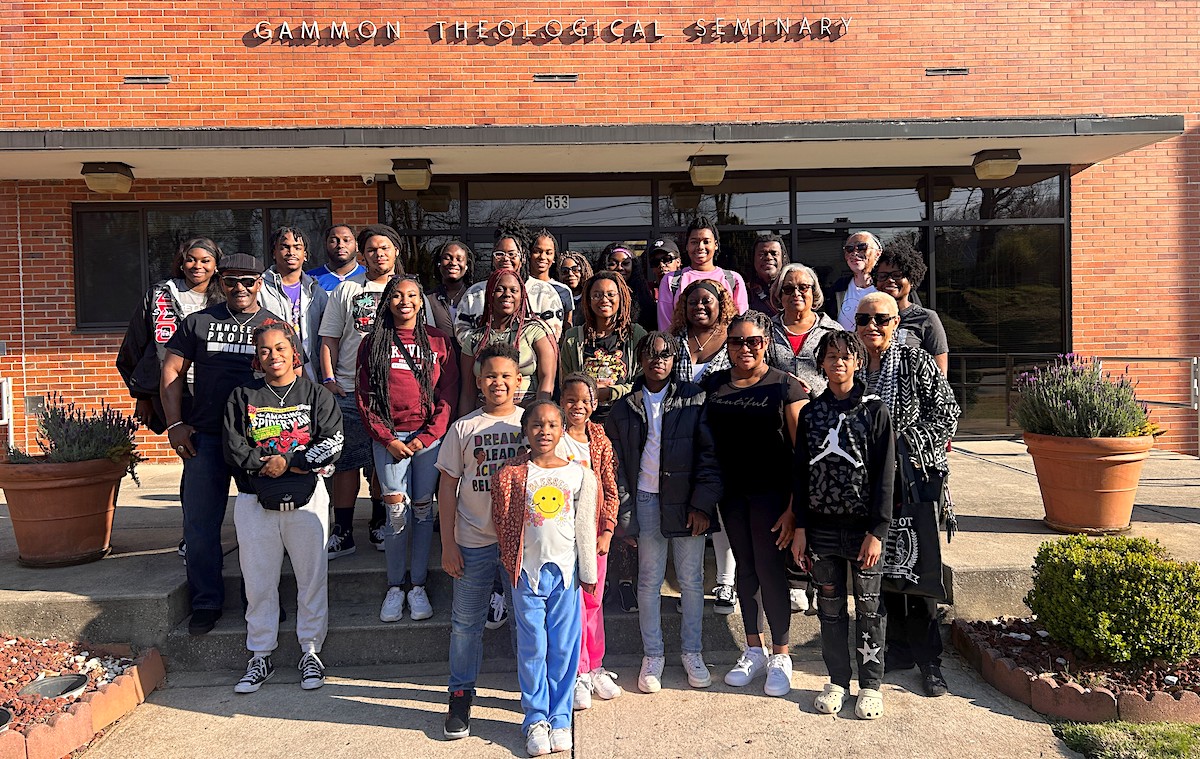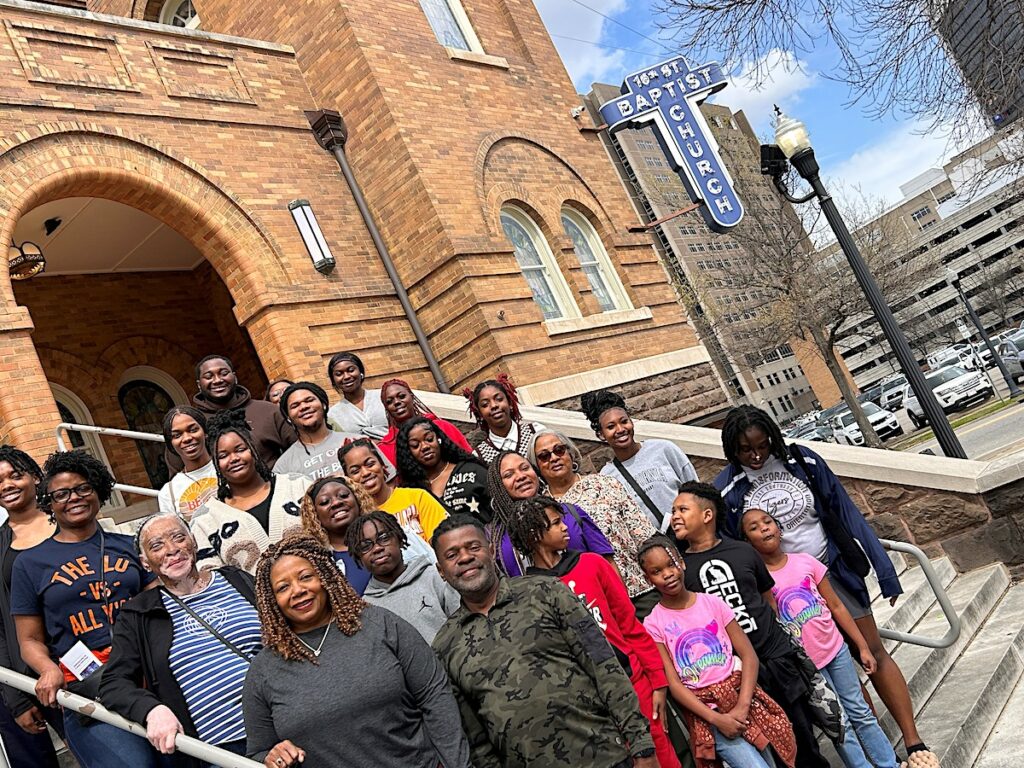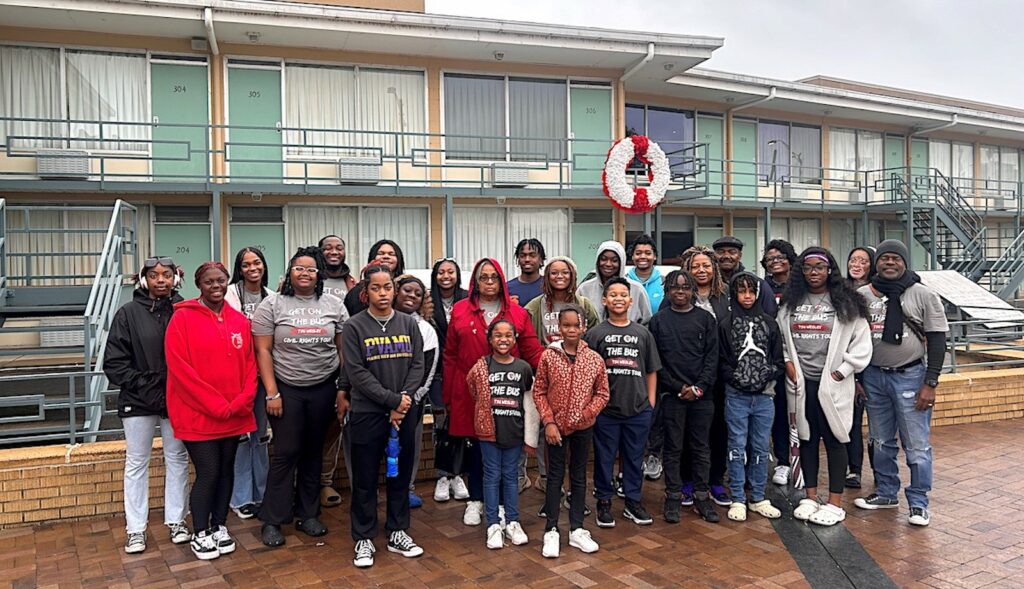
By Brant Mills
In March, Rev. Tabitha Mock, Director of TSU’s Wesley Foundation, led a group of 27 on a civil rights tour to visit historical sites in Alabama, Georgia, and Tennesee. Those present included Wesley Foundation students from Texas Southern University, Prairie View A&M, and Houston Community College, in addition to pastors and board members.
The tour started on Sunday, March 10, with a special sendoff celebration at Mr. Vernon UMC by pastor Herbert Addison, who offered a sermon and a sendoff discussing the importance of receiving the baton as the next generation charged with knowing and sharing the stories and struggles of those who came before them. Students participated in a foot washing service and had lunch and cake before embarking on the trip.
The first stop was Montgomery, Alabama, where they visited the Alabama State Capital building and stood on the steps where Dr. Martin Luther King, Jr. spoke about everyone having the right to vote. Then they went to Selma and visited to the National Voting Rights Museum, which highlighted events detailing the sacrifices made for that right.
They walked together across the Edmund Pettus Bridge, following in the footsteps of those who were there on Bloody Sunday when Dr. King and other leaders led people from Selma to Montgomery. Rev. Mock noted they offered reflections as they walked together.

Next, they travelled to Birmingham to visit the Rosa Parks Museum at the Old Sardis Baptist Church. Then they visited the 16th Street Baptist church in Birmingham – where 4 little girls lost their lives in a bombing at 10:22 in morning before church started.
“They had an experience room where we went and listened to a documentary and saw live footage of the scene of what was going on in the park across street where everyone ran to for shelter,” Rev. Mock said. “We had a chance to visit the church and go and see the stairs were where the dynamite may have been… That was one of the most impactful tours where I really saw how our students were affected by what they saw. It was like no one moved and a few of our students began to weep.”
Mock said at the end of each night she really worked to figure out how to incorporate reflection time where the group could be still and quiet together. “It was similar to what we do at Wesley, with conversations on the couch, but we talked wherever we were that day – at a church, a restaurant… I saw God move on several occasions during this trip. But when I feel like they really, really began to understand… I feel that the trip was causing them to think; how we can continue this progress in peaceful Christian-like ways and not give up on being the change we want to see in the world… It was that night.”
The group continued on to Atlanta, Georgia to visit Gammon Theological Seminary. “Gammon is the only historically black United Methodist Seminary in our nation,” Mock noted, adding their tour of the seminary included a conversation with Dr. Candace Lewis.
From there they visited The Atlanta University Center, which was a place where students demonstrated peacefully through lunch sit-ins during the fight for their rights.

They continued on to Memphis, Tennesee where the National Civil Rights Museum offered another encounter with the life and legacy of Dr. Martin Luther King Jr. “We visited the Museum which includes the Loraine Motel.” There the students could see the last room MLK slept in, were even able to see the balcony where he was shot.
They concluded their tour at the Greatwood CME church with a closing worship and commissioning service where students were draped with stoles. Rev. Conrell Lockett who was on the tour, and pastor Walter Brown from Greatwood CME prayed over the group. “They asked that God would empower them to live a calling to be that which we see in the world and that they would never forget,” Mock continued.
Reflecting on the journey, she said she expressed a profound sense of gratitude to everyone who made it happen, and she said she felt a sense of extreme gratefulness. “I was proud of us, and of the Wesley Foundation, and the board… And for those who gave and prayed – Thank you!”
She noted that trip was coordinated by Rev. Julius Wardley and Rev. Herbert Addison. “Those two worked really, really hard to put this together and ultimately were unable to go. They planned everything and I felt honored that I could share this with our students.” Mock acknowledged the experience as what she described as a testament to the power of the UMC connection and the enduring legacy of social justice. “This is what connectional ministry is all about. I had been to many of those places – but it meant everything for me to see our young people understand.”
